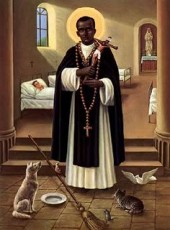Catholic Blesseds, Saints, Solemnities & Holy Days

Saint Martin de Porres
Feast Day: November 3
Patronage: Mississippi, Diocese of Biloxi, Hair Stylists, Innkeepers, Lottery, Lottery Winners, Mixed-Race
At the age of fifteen, he asked for admission to the Dominican Convent of the Rosary, in Lima, and was received first as a servant boy, and as his duties grew he was promoted to Almoner. Eventually he felt the call to enter the Dominican Order, and he was received as a Tertiary. Years later his piety and miraculous cures led his Superiors to drop the racial limits on admission to the Friars, and he was made a full Dominican. It is said that when his convent was in debt, he implored them, “I am only a poor mulatto, sell me”.
When he was 34, after receiving the habit of a coadjutor brother, Martin was assigned to the infirmary, where he was placed in charge and would remain in service until his death at the age of fifty-nine. His superiors saw in him, the virtues necessary to exercise unfailing patience in this difficult role. It was not long before miracles were attributed to him. St. Martin also cared for the sick outside his convent, often bringing them healing with only a simple glass of water. One day an aged beggar covered with ulcers and almost naked, stretched out his hand, and martin took him to his own bed. He was reproved by some of his Brothers, and Martin replied, “Compassion, my dear Brother, is preferable to cleanliness”.
When an epidemic struck Lima, there were in this single Convent of the Rosary sixty friars who were sick, many of them novices in a distant and locked section of the convent, separated from the professed. Martin is said to have passed through the locked doors to care for them, a phenomenon which was reported in the residence more than once. The professed, too, saw him suddenly beside them without the doors having been opened. Martin continued to transport the sick to the convent until the provincial superior, alarmed by the contagion threatening the religious, forbade him to continue to do so. His sister, who lived in the country, offered her house to lodge those whom the residence of the religious could not hold.
One day he found on the street a poor Indian, bleeding to death from a dagger wound, and took him to his own room until he could transport him to his sister’s hospice. The superior, when he heard of this, reprimanded St. Martin for disobedience. He was extremely edified by his reply: “Forgive my error, and please instruct me, for I did not know that the precept of obedience took precedence over that of charity. The superior gave him liberty thereafter to follow his inspirations in the exercise of mercy.
Martin did not eat meat. He begged for alms to procure necessities the convent could not provide. In normal times Martin succeeded with his alms to feed 160 poor persons every day, and distributed a remarkable sum of money every week to the indigent. Martin founded in the city of Lima a residence for orphans and abandoned children. This lay brother had always wanted to be a missionary, but never left his native city; yet even during his lifetime he was seen elsewhere, in regions as far distant as Africa, China, Algeria and Japan. An African slave who had been in irons said he had known Martin when he came to relieve and console many like himself, telling them of heaven. When later the same slave saw him in Peru, he was very happy to meet him again and asked him if he had had a good voyage; only later did he learn that Saint Martin had never left Lima. A merchant from Lima was in Mexico and fell ill; he said aloud: “Oh, Brother Martin, if only you were here to care for me!” and immediately saw him enter his room. And again, this man did not know until later that he had never been in Mexico.





